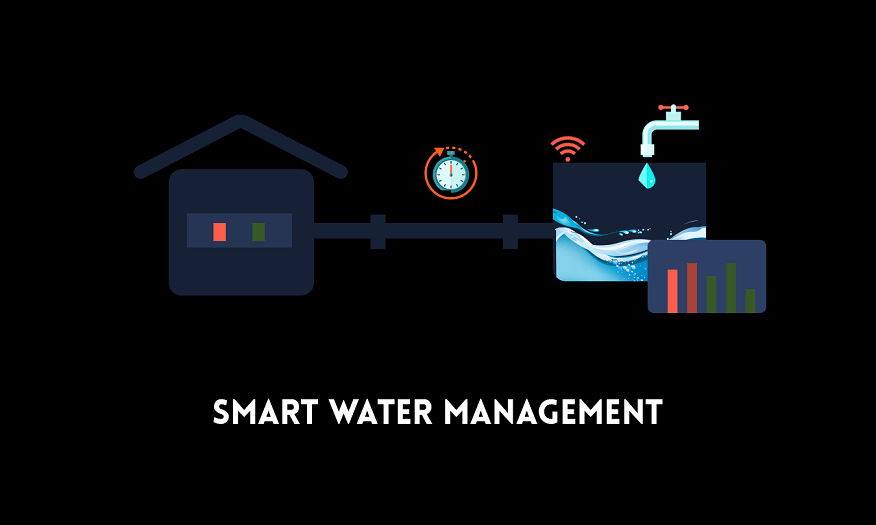
Smart Water Management Systems offer an integrative and technology-driven solution for managing water resources, benefiting both water utilities and the environment. Through reduced water wastage, improved quality, and responsible use, these systems ensure reliable and sustainable supplies of drinking water for present and future generations.
Smart water management system is an innovative technology-driven approach to efficiently and sustainably manage the distribution, consumption, and conservation of water resources. Utilizing advanced water sensors, data analytics and automation techniques, this innovative system monitors, controls, optimizes various aspects of water management to ensure responsible use and preservation of this limited and precious resource.
Smart Water management using IOT systems are created to address the challenges posed by urbanization, climate change, population growth and water scarcity. By combining real-time data collection and analysis with smart decision-making algorithms, these comprehensive approaches help manage water resources intelligently and sustainably.
Internet of Things (IoT) technology represents a revolutionary approach to effectively and intelligently manage water resources in an ever more interdependent world. IoT technology empowers water utilities, municipalities, and industries alike to monitor, analyze, and optimize real-time processes related to water consumption for increased efficiency, sustainability, and conservation efforts.
Smart Water Management with IoT
Intelligent Internet of Things (IoT) solutions are revolutionizing water management through connected devices and data analysis, revolutionizing water administration with ease.
- Sensors and Devices: IoT sensors are strategically deployed throughout water infrastructure – reservoirs, treatment plants, pipelines and end user points like homes and businesses – in order to capture real-time information on all aspects of its ecosystem. These sensors collect data continuously from these sources so as to provide an in-depth view.
- Data Analytics: Utilizing advanced data analytics and machine learning algorithms, IoT sensors generate massive volumes of data that need to be processed by advanced machine learning algorithms in order to detect anomalies, trends and patterns that could aid decision-making processes. This analysis allows for the detection of anomalies, trends and patterns which provide vital insight.
- Remote Monitoring: IoT technology makes remote monitoring of water infrastructure possible, eliminating the need for physical inspections and helping identify any issues such as leaks, contamination or equipment malfunction quickly. This proactive approach may also enable faster decision-making when leaks, contamination or equipment malfunction are identified as imminent problems.
- Automation and Control: IoT-enabled systems can automate various processes, such as adjusting water flow rates, controlling pumps or activating emergency shut-off valves when issues or changing demand is detected.
- User Engagement: Consumers can access real-time water usage data through mobile apps or web platforms, providing them with access to critical data regarding water conservation and efficiency decisions. This enables them to make smart decisions regarding water usage efficiency.
- Predictive Maintenance: IoT data can help forecast when equipment and infrastructure components may fail, enabling scheduled maintenance and preventing costly downtime.
- Water Resource Management: IoT-enabled systems aid water utilities in making informed decisions about resource allocation, helping ensure a steady and uninterrupted supply of clean water while minimizing waste.
- Environmental Impact: By optimizing water usage and minimizing waste, Smart Water Management using IoT contributes to environmental sustainability by conserving resources and decreasing carbon emissions associated with treatment and distribution processes.
Advantages of Smart Water Management System
Their advantages extend from improved efficiency, sustainability, and overall effectiveness of resource management.
- Water Conservation: SWMS can identify and repair leaks quickly to decrease water loss. Additionally, by optimizing distribution and consumption patterns it promotes responsible water use – particularly essential in regions facing severe water scarcity.
- Improved Water Quality: Continuous monitoring and real-time data analysis allow early identification of any water quality issues, guaranteeing that consumers receive water that complies with regulatory standards and is safe to consume.
- Effective Resource Allocation: SWMS provides insight into water demand patterns, enabling utilities to allocate resources more effectively – meaning water will always be available when and where needed most, reducing waste and energy consumption in the process.
- Cost Savings: By reducing water loss, optimizing resource allocation, and decreasing manual inspections and repairs, SWMS can lead to significant cost savings for water utilities as well as consumers.
- Real-Time Monitoring: SWMS provides real-time monitoring of water infrastructure, providing faster responses to emergencies such as leaks or contamination incidents and providing quicker responses in an effort to avoid or mitigate potential disasters while decreasing downtime. This allows the protection and mitigation of potential disasters while decreasing potential downtime costs.
- Predictive Maintenance: With data analytics and predictive modeling capabilities, SWMS assists utilities with anticipating maintenance needs ahead of time – allowing for proactive repairs that reduce infrastructure failure risks while mitigating costly repairs in future.
- Environmental Sustainability: Reduced water waste and efficient resource management contribute to environmental sustainability by conserving scarce water supplies while decreasing carbon footprint associated with treatment and distribution processes.
- Customer Engagement: SWMSs can include consumer-facing interfaces such as mobile apps or web portals that give real-time data on water usage to raise consumer awareness and encourage responsible water consumption. This fosters responsibility in water use.
- Adaptability to Climate Change: Southwest Manufacturing Solutions can adapt to shifting weather patterns and climate challenges, helping water utilities respond efficiently to droughts, storms and other weather events.
- Complying With Regulations: Smart Water management systems aid utilities in meeting and surpassing water quality and conservation regulations, decreasing risk for fines or penalties by doing so.
Planet Smart City’s Approach
Planet Smart City is an innovative urban development company committed to developing cutting-edge and eco-friendly solutions for the cities of tomorrow. Established with the mission of improving urban living conditions while meeting global urbanization challenges head-on.
- Smart Urban Planning: Planet Smart City employs advanced technologies and data-driven insights to craft urban developments that are efficient, sustainable and capable of meeting the evolving needs of residents. Their projects are often distinguished by digital infrastructure integration, renewable energy sources and cutting-edge urban services.
- Affordable Housing: One of the key focuses of Planet Smart City. Their projects aim to address housing shortages while creating high-quality living spaces that foster community spirit and well-being.
- Inclusivity: Planet Smart City strives to build inclusive communities where individuals from various backgrounds can thrive. Their developments feature social spaces, cultural initiatives and community building programs designed to build social cohesion and foster a sense of belonging among its residents.
- Planet Smart City: Our mart projects place sustainability at the core, prioritizing eco-friendly building practices, energy-saving solutions, and reduced environmental impacts to promote sustainable living and minimize residents’ carbon footprints.
- Digital Connectivity: Planet Smart City embraces digitalization to enrich residents’ quality of life, offering digital platforms and solutions that improve access to services like healthcare, education, transportation and security while creating an engaged community environment.
Conclusion
These innovations in water management and urban development demonstrate the power of technological solutions to address the complex problems affecting cities and natural resources. Their promise is creating more resilient, efficient, and inclusive urban environments while protecting precious water sources around the globe.
Please change this title. Doesn’t explain it well and it is too vague.
Please redo this paragraph.
